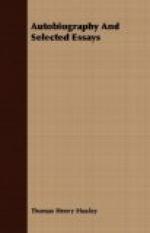A scholar of the highest type and a fearless defender of true and honest thinking, Huxley certainly was: but the quality which gives meaning to his work, which makes it live, is a certain human quality due to the fact that Huxley was always keenly alive to the relation of science to the problems of life. For this reason, he was not content with the mere acquirement of knowledge; and for this reason, also, he could not quietly wait until the world should come to his way of thinking. Much of the time, therefore, which he would otherwise naturally have spent in research, he spent in contending for and in endeavoring to popularize the facts of science. It was this desire to make his ideas prevail that led Huxley to work for a mastery of the technique of speaking and writing. He hated both, but taught himself to do both well. The end of all his infinite pains about his writing was not because style for its own sake is worth while, but because he saw that the only way to win men to a consideration of his message was to make it perfectly clear and attractive to them. Huxley’s message to the people was that happiness, usefulness, and even material prosperity depend upon an understanding of the laws of nature. He also taught that a knowledge of the facts of science is the soundest basis for moral law; that a clear sense of the penalties which Nature inflicts for disobedience of her laws must eventually be the greatest force for the purification of life. If he was to be remembered, therefore, he desired that he should be remembered primarily as one who had helped the people “to think truly and to live rightly.” Huxley’s writing is, then, something more than a scholarly exposition of abstruse matter; for it has been further devoted to the increasing of man’s capacity for usefulness, and to the betterment of his life here on earth.




